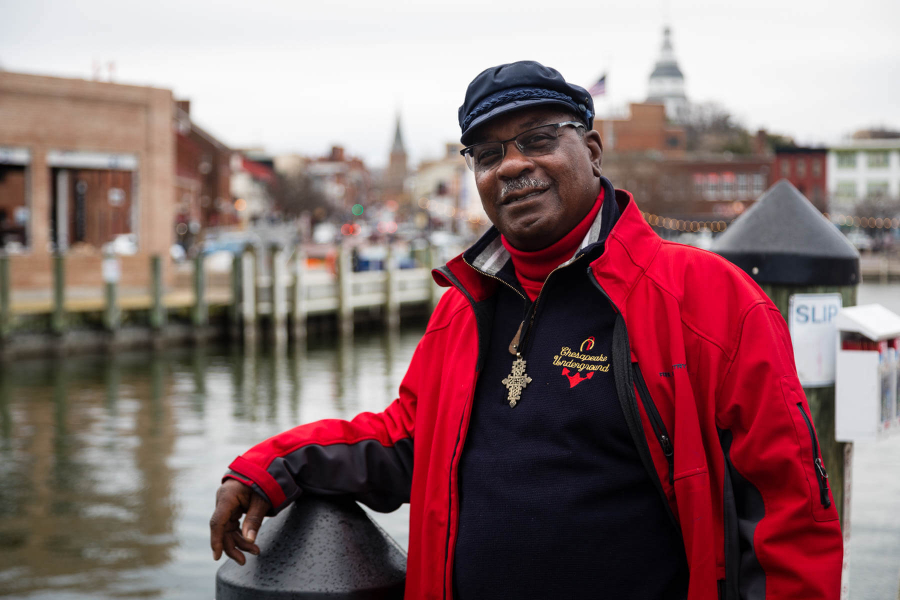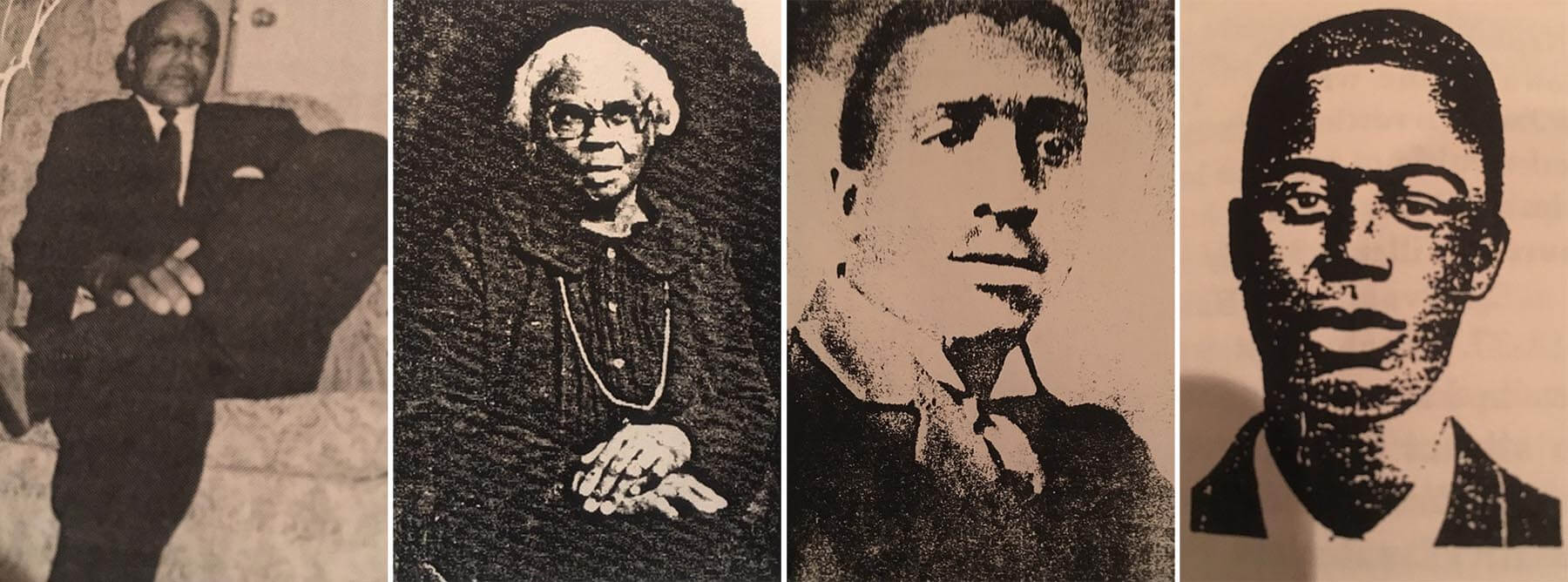A country boy from East Baltimore
Vincent O. Leggett discusses his early connection to the environment

You cannot begin to understand the history of the Chesapeake Bay without learning from Vincent Leggett. For more than 40 years, the historian, author and advocate has studied the Bay and its people, focusing on black watermen, and shining a light on their under-told stories. Through his two books, The Blacks of the Chesapeake and The Chesapeake Bay Through Ebony Eyes, he tells the stories of the men and women who helped build this region, contributed to its history and left their mark on its cultures. Outside of writing, he still works to tell and promote those stories, both past and present, as the founder and head of the Blacks of the Chesapeake Foundation.
Leggett shares with us his past, his work and what keeps him going. Responses have been edited for length and clarity.
Where are you from?
I was born in 1953 and grew up in the city, but I consider myself a “country boy from East Baltimore.” I know that might sound like an oxymoron, but the essence is that I’m street smart and possess a strong work ethic, thanks to my parents. They grew up on different types of farms in North Carolina, and I have trekked back to their homeplaces many times over the past 60 years.
My maternal grandparents, Arthur Smith and Bessie Johnson Tillery Smith, owned a large farm in “Old” Tillery, North Carolina, where they produced tobacco, peanuts, cotton and soybeans. Arthur owned a small general store in town, was an educational advocate and was a leader of the Tillery Resettlement Community, a farming town constructed the 1930s on the grounds of former plantations as a project of the New Deal. Grandma Bessie grew beautiful flowers, tended a large vegetable garden and raised pigs and chickens.
Bessie was also active in the formation of the Concerned Citizens of Tillery, a group dedicated to preserving the town’s history and community spirit. From the 1830s until 1865, her ancestors—the Johnson family—were enslaved on the Caledonia and J.R. Tillery plantations. Members of that family escaped slavery and joined the U.S. Army as members of the U.S. Colored Troops, fighting for their own freedom. Those family members and survivors received Civil War pensions and bounty land as veterans.
I spent the most time at the Tillery family farm and developed a great relationship with my grandfather. I vividly remember rising while it was still dark, and after breakfast and chores, I was in my granddad’s truck waiting for him as the sun cleared the horizon. He would often say, “Everything didn’t get broke in one day, and they all can’t be fixed in one day.” He taught me how to set priorities and establish a daily plan for achieving those goals. My granddad provided me with a great counterpart to the grit and grime of the streets in Baltimore.
I could see a marked difference in my parents’ upbringing. My dad, Charlie Leggett, and his parents were tenant farmers. This relationship was more of a holdover from the period of slavery.
My dad’s family primarily raised cotton, watermelons and cantaloupes and did “truck farming,” as it was called. Dad’s folks were hard-working, church-going and living a more communal life. They had a large extended family all living nearby each other, so when I would visit, I had plenty of cousins around to work in the fields and enjoy the outdoors with.
My dad and his uncles, brothers and cousins formed the Leggett’s Sportsmen Club. We were all avid hunters and fishermen and we loved rising before dawn and being out in the woods or fishing on the Chesapeake Bay. We had some great times. Family reunions were always week-long events and a big part of my dad’s life. All of us have participated every year, even up to this day.

How did you get involved in the environmental field?
I was extremely fortunate to have those southern land-based experiences at an early, formative age. They started my love affair with the environment. Many people live their entire lives and never walk on a dirt path or stomp in mud puddles. Even today, I visit the family farms and sometimes hunt rabbit and deer. But more often, I carry my digital camera over my shoulder instead of my old 12-gauge Browning. And I will always enjoy my walks along dirt paths and stomping in mud puddles.
What are you most proud of?
The fact that my wife, Aldena Pinkney Leggett, and our children, grandchildren and great-grandchildren love the Chesapeake Bay. We all are dedicated to continually telling the story of Blacks of the Chesapeake (BOC) for generations yet unborn. The BOC project is a wealth of books, documentary films, artifacts and extensive archival materials that I have collected out of my passion for celebrating the natural and cultural diversity of the Bay. BOC has now been cemented in the annals of American history; the Library of Congress and U.S. Congress have designated it as Local Legacy Project.
The Blacks of the Chesapeake’s Local Legacy Collection will always be available through partnerships with the Library of Congress, Maryland Archives Special Collections and the Enoch Pratt Library Digital On-Line Program. Our plan is to leave a remnant that the next set of environmental advocates can graft into their work. We must continue to safeguard the national treasure of the Chesapeake Bay and emphasize the ethnic richness that makes up its history.
Because of our efforts, more people will understand that African Americans are at the heart of the Bay, as workers, sailors and even as “Admirals of the Chesapeake Bay,” an award bestowed by the governor of Maryland for outstanding stewardship. I was honored to receive the award in 2003, and I am proud to represent African Americans alongside Marcellus Hall (1954), Cecil C. Burton (1997), Earl White (1998) and Eldridge Meredith (2017).
Who inspires you?
I am moved by the life and works of Frederick Douglass (1818-1895), who once described the Bay as “waters of hope and waters of despair.” Douglass wrote, “This Bay Shall Yet Bear Me to Freedom,” and I share that feeling of the Chesapeake being a place to escape from the urban world and get back to my outdoor home. I also continue to honor the legacy of Harriet Tubman (1821-1913), who utilized the Chesapeake Bay and its many tributaries as a gateway to freedom. However, my grandfather and my parents are my heroes.
My grandfather Arthur Smith served in the U.S. Army in World War I. He was a deacon at the Galilee Baptist Church and a leader in the Local Farm Bureau. I appreciated the fact that he owned his farm in the sharecropping era and loved the earth.
What does the Chesapeake Bay mean to you?
I love the Chesapeake and want to leave it better than I found it 60 years ago. Early on I caught the spirit of the bay from African American watermen and women, and I remain committed to preserving their stories and protecting Maryland’s unique estuary. In the words of Captain Eldridge Meredith, Admiral of the Chesapeake, “The Bay has been good to me, and I have been good to her.”

Comments
Knew of Mr. Leggett when he attended a Baltimore city public high school in Northeast area called Northern High School. Never knew during the " Black Power" days that Vincent had a connection to the land and the idea of ownership.
Greetings,
I am interested in the purchase of Mr. Leggits 2 books on the Chesapeake.
I am an avid fisherwoman and love the Bay.
Very good story.lots of history for me . always good to know what our blacks have done in the past which will always be a part of history.pround to see that a young man and his family is keeping I'll alive about the bay.we Wii remain in history books as great and proud black people because of you and your family. Be blessed.
http://memory.loc.gov/diglib/legacies/loc.afc.afc-legacies.200003123/
Much wisdom & empirical knowledge from the school of a life well ived & shared w/others.
Mr. Leggett works regularly as a substitute at my school Mary Moss @ J. Albert Adams Academy. He is a wealth of knowledge and role model for our students. We are blessed he chooses to come to our school and share with our staff and students.
What a great and interesting read.
Vince Leggett has a rich heritage to share. So glad that he is successfully spreading his passion for the protection and preservation of the Chesapeake Bay and the watermen and women who have, throughout the years, appreciated and protected this environmental treasure.
Important historical and inspirational stories to share with our youth.
You can find an audio podcast containing remarks by Mr. Leggett and other distinguished guests from an October 2018 event held at The Seafarers YC in Annapolis, at http://theescapepods.com/?p=671
Enjoy!
Thank you!
Your comment has been received. Before it can be published, the comment will be reviewed by our team to ensure it adheres with our rules of engagement.
Back to recent stories